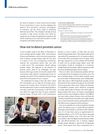 54 citations,
August 2009 in “Dermatologic Surgery”
54 citations,
August 2009 in “Dermatologic Surgery” Modern hair transplants use small grafts for a natural look and drugs to prevent further loss, with high patient satisfaction.
 52 citations,
June 2009 in “Current Opinion in Endocrinology, Diabetes and Obesity”
52 citations,
June 2009 in “Current Opinion in Endocrinology, Diabetes and Obesity” The document concludes that hair transplantation and gene therapy may be important for future hair loss treatment.
 44 citations,
October 2010 in “BJUI”
44 citations,
October 2010 in “BJUI” 5-α-reductase inhibitors reduce prostate cancer risk but may cause sexual dysfunction and don't affect high-grade tumor or death rates.
 34 citations,
April 2009 in “Expert Opinion on Pharmacotherapy”
34 citations,
April 2009 in “Expert Opinion on Pharmacotherapy” Some treatments work for common baldness, but there's less evidence for other hair loss types, and more research is needed.
 6 citations,
October 2007 in “Medical Hypotheses”
6 citations,
October 2007 in “Medical Hypotheses” Male pattern baldness might have evolved to help protect against prostate cancer by increasing UV radiation on the scalp.
 2 citations,
October 2015 in “Primary Care: Clinics in Office Practice”
2 citations,
October 2015 in “Primary Care: Clinics in Office Practice” Doctors should diagnose hair loss by examining the patient and possibly doing tests, and then treat it based on the type, which may prevent permanent hair loss.
 August 2008 in “Current Opinion in Internal Medicine”
August 2008 in “Current Opinion in Internal Medicine” In 2007, prostate cancer research improved understanding of risk, diagnosis, and treatment, but also showed heart risks with certain therapies and the need for personalized care.
 35 citations,
May 2012 in “Expert Opinion on Pharmacotherapy”
35 citations,
May 2012 in “Expert Opinion on Pharmacotherapy” The document concludes that there are various treatments for different types of alopecia, but more research is needed for evidence-based treatments.
 34 citations,
August 2011 in “Journal of Natural Medicines”
34 citations,
August 2011 in “Journal of Natural Medicines” Puerariae Flos extract may help treat hair loss by blocking a hair loss-related enzyme and promoting hair growth.
 February 2007 in “Lancet Oncology”
February 2007 in “Lancet Oncology” Using a single PSA level to decide on a prostate biopsy is not effective; a more personalized approach considering various factors is recommended.
 45 citations,
September 2012 in “Life Sciences”
45 citations,
September 2012 in “Life Sciences” Aconiti Ciliare Tuber extract may help hair grow by activating a specific cell signaling pathway.
 3 citations,
June 2017 in “Journal of Biomaterials Applications”
3 citations,
June 2017 in “Journal of Biomaterials Applications” Keratin extract from human hair was found to promote hair growth in mice.
 October 2024 in “International Journal of Ayurveda Research”
October 2024 in “International Journal of Ayurveda Research” Emblica officinalis and Eclipta alba may help treat hair loss naturally.
 April 2007 in “Nature Clinical Practice Urology”
April 2007 in “Nature Clinical Practice Urology” TICE salvage chemotherapy is effective for treating germ-cell tumors with poor prognosis.
 April 2007 in “Nature Clinical Practice Urology”
April 2007 in “Nature Clinical Practice Urology” Teaching men with simple bladder problems self-management skills can improve their symptoms and quality of life.
 6 citations,
May 2008 in “Current Opinion in Oncology”
6 citations,
May 2008 in “Current Opinion in Oncology” 2007 research improved understanding of prostate cancer risk, diagnosis, and treatment, but also showed the need for personalized treatment and further study on certain therapies' risks.
 5 citations,
April 2019 in “Plastic and reconstructive surgery. Global open”
5 citations,
April 2019 in “Plastic and reconstructive surgery. Global open” Fractional lasers could help hair regrowth in androgenic alopecia, but more research is needed to confirm their effectiveness and safety.
 64 citations,
January 2015 in “BioMed Research International”
64 citations,
January 2015 in “BioMed Research International” Certain growth factors can promote hair growth in mice by activating hair growth-related proteins.
 13 citations,
January 2015 in “Evidence-based Complementary and Alternative Medicine”
13 citations,
January 2015 in “Evidence-based Complementary and Alternative Medicine” Garlic chive extract helped mice grow more hair by increasing a specific growth factor.
 1 citations,
January 2015 in “Genetics and Molecular Research”
1 citations,
January 2015 in “Genetics and Molecular Research” Stopping S100A3 activity slows down hair growth in mice.
 148 citations,
April 2009 in “Molecular Pharmaceutics”
148 citations,
April 2009 in “Molecular Pharmaceutics” Researchers developed promising agents for prostate cancer imaging, with the best one showing high potential for clinical use.
 68 citations,
March 2018 in “Biomaterials”
68 citations,
March 2018 in “Biomaterials” Tiny needles with valproic acid can effectively regrow hair.
 4 citations,
December 2015 in “Journal of Medicinal Plants Research”
4 citations,
December 2015 in “Journal of Medicinal Plants Research” A plant mixture extract helped grow hair by boosting cell growth and growth factors while blocking a hair loss-related enzyme.
 September 2023 in “bioRxiv (Cold Spring Harbor Laboratory)”
September 2023 in “bioRxiv (Cold Spring Harbor Laboratory)” Freezing gamma-irradiated amniotic fluid may help hair growth and speed up the growth phase.
 9 citations,
August 2015 in “Tissue Engineering and Regenerative Medicine”
9 citations,
August 2015 in “Tissue Engineering and Regenerative Medicine” Human skin cell byproducts can potentially be used to treat hair loss and promote hair growth.
 9 citations,
March 2015 in “Journal of Microbiology and Biotechnology”
9 citations,
March 2015 in “Journal of Microbiology and Biotechnology” Ultra-high molecular weight poly-γ-glutamic acid may help promote hair growth.
4 citations,
March 2022 in “Pharmaceutics” Regenerative cellular therapies show promise for treating non-scarring hair loss but need more research.
2 citations,
September 2019 in “Springer eBooks” January 2020 in “Springer eBooks”  October 2020 in “Journal of Pakistan Association of Dermatology”
October 2020 in “Journal of Pakistan Association of Dermatology” Finasteride appears safe for long-term sperm concentration, but more research is needed for clear conclusions.



























